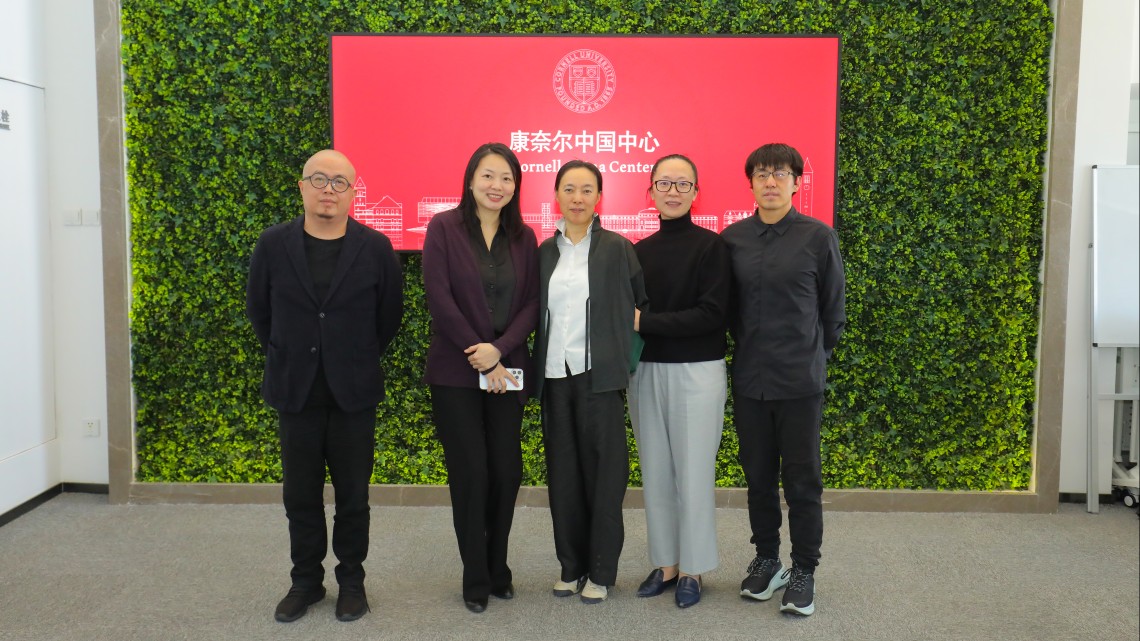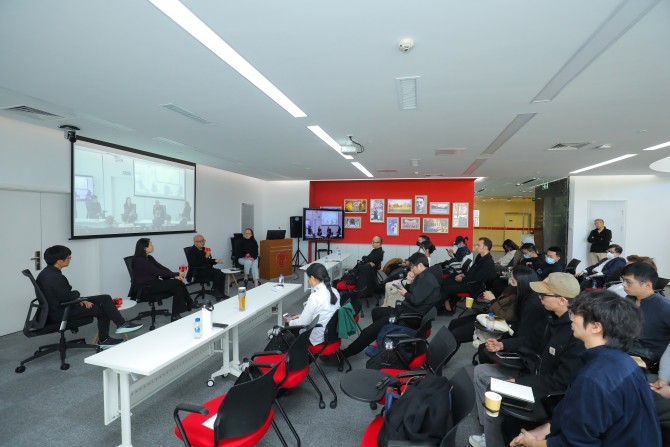
Speakers at the Cornell China Center in Beijing included Gang Song (Atelier cnS), Tiantian Xu (DnA Design and Architecture), Wenyu Lu (Amateur Architecture Studio), Ying Hua (Director of the Cornell China Center) and Yehao Song (SUP Atelier).
News directly from Cornell's colleges and centers
Panel explores architectural innovations in rural China
By Nina Chaopricha
Chinese architects are repurposing local materials and cultural practices for new architectural methods, according to a panel of renowned Chinese architects at the opening panel for the 2023 Preston H. Thomas Memorial Symposium. The event highlighted collaborative design work with local communities and craftsmen, government agencies and outside experts.
The two-day symposium, hosted by the College of Architecture, Art and Planning and organized by assistant professor of architecture Leslie Lok, featured keynote speakers and panels responding to the theme “FRINGE: New Centers for Architecture and Urbanism.”
The Cornell China Center in Beijing kicked off the symposium on March 2 with remarks from Lok, who welcomed over 200 attendees in person and online. “The symposium aims to unpack the FRINGE’s spatial, ecological and technological capacities to reveal innovative architectural and urban design strategies that strive to be more environmentally conscious, socially equitable and architecturally adaptive.”
These themes were reflected in the keynote talks of Shu Wang, 2012 Priztker Architecture Prize Laureate, and Wenyu Lu, architect with Amateur Architecture Studio. Both Lu and Wang described work in rural villages that engaged residents in creating sustainable buildings and transforming residential and public spaces.
“The local communities were excited to see the young students, and the students were able to leave something significant behind,” said Lu. Her work with university students and village craftsmen helps to create and test on-site architectural models for new types of bamboo and wood structures. “The villages became cleaner, and the villagers' thinking toward these methods of construction was transformed as well.”
Architects Tiantian Xu, Yehao Song and Gang Song followed the keynotes with a panel discussion on “rural iterations” — the idea that the traditional building materials and construction methods of the countryside can influence new architectural methods.
They spoke of their work reimagining public spaces — rebuilding a decaying bridge into a covered space for markets and festivals, transforming abandoned rock quarries into amphitheaters and converting a crumbling courtyard into a contemporary bamboo pavilion.
In each project, the panelists described the value of collaboration with local communities. Yehao Song, founder of SUP Atelier and a leading Chinese scholar in the field of sustainable construction at Tsinghua University, worked with rural villagers and a team of architects to create a multipurpose space.
Using bamboo, they designed pavilions that could be used for movie nights, banquets, seminars and more.
"I was fascinated to hear how much care and research went into the design before even starting,” said Cornell design fellow Hanxi Wang who helped to coordinate the symposium. “In terms of researching the local cultures, communities, construction methods, but also how much the local craftsmen are involved in the construction processes."
The panel provided a lens for understanding the broader process of rural revitalization across China. “The innovative and sincere effort of the architects has given villages vibrance and identity, emerging out of the vague image they had as a reservoir of food, land, labor and resources for urbanization,” said Ying Hua, director of the Cornell China Center and moderator of the panel.
The 2023 Preston H. Thomas Memorial Symposium Exhibition accompanies the event, showcasing the work of leading creative experts who explore the integration of regional material, technological and spatial practices in the rural-urban territories of East and Southeast Asia. It will be featured in Milstein Hall’s Bibliowicz Family Gallery until March 23.
Nina Chaopricha is the Ithaca Campus Manager of the Cornell China Center.
Media Contact
Get Cornell news delivered right to your inbox.
Subscribe

